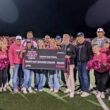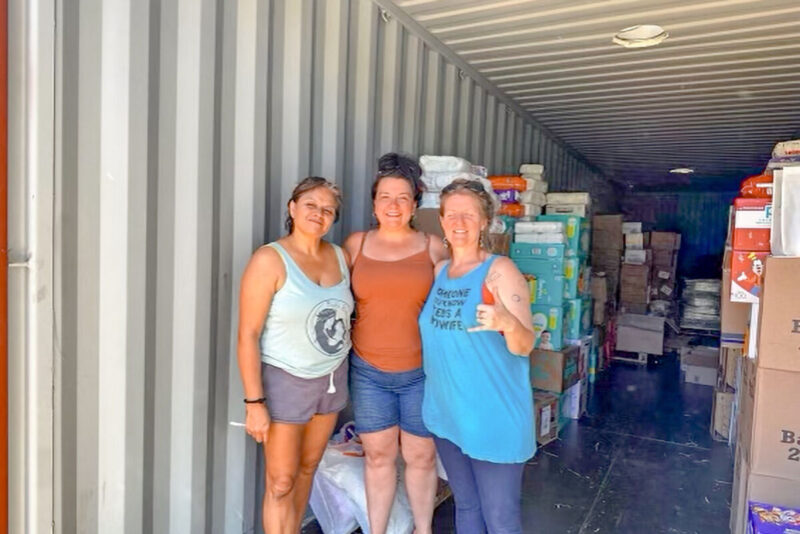Benny Westcott
**CORRECTION: The original upload of this story was ran through an AI tool to remove formatting from layout. It grossly overstepped and changed the story causing it to be erroneous. We have removed the tool from our stack and apologize for the negligence. The following is correct.**
Sweet Home City Councilor Angelita Sanchez had for quite a while been planning a fun mid-August trip to Lahaina, Hawaii to celebrate her fiancé’s 50th birthday. Sanchez’s plans abruptly changed when the coastal town of about 13,000 became the site of the deadliest U.S. wildfire in a century, claiming the lives of 115 people and possibly more, as Maui County officials have put the total number of people that remain unaccounted for at more than 1,000.
Instead of canceling the trip, Sanchez decided to still go, but her journey would take on a very different tone.
“I decided, we’re still going, and we’re going to help,” she said. “But we need to find somewhere to stay.”
She wasn’t able to get in contact with the host of her previously planned place, so Airbnb offered her a refund and an opportunity to book on a different side of the island. But Sanchez didn’t like that idea.
“I made that decision that we’re going to still go and spend our tourism dollars there, but it’s not really going to be a celebration; we’re gonna go help,” she said.
So she eventually found an Airbnb to stay at in nearby Kihei.
She went with a suitcase full of about 75 pounds worth of stuff, spending around $300 of her own money and also enlisting help from others, including Sweet Home citizens, to fill it.
The suitcase included can openers, diapers, wipes, hair ties, fingernail clippers, tweezers, sunscreen, and deodorant.
But she said it was difficult to try to fit into an organization in which the locals and natives weren’t suspicious of her as an outsider.
When Sanchez arrived, she was told by a Maui Rapid Response local manager to just stand by because the organization already had enough help, “there’s enough locals, there’s big Hawaiian men with trucks.”
But Sanchez said “I just couldn’t take no for an answer, because I had this desire in my heart to do something, and I have experience with this type of thing.”
She chose a minivan instead of a convertible for her rental car because she was intending to transport goods and people.
“I was just praying for God to give us an opportunity, because it seemed like wherever we tried to reach out and offer help instead of just showing up somewhere that we weren’t welcome, it just kept getting turned down,” she said.
Then someone told her that an organization called Pacific Birth Collective needed help up in Haiku. When she arrived there Sanchez said she encountered someone who was a little standoffish, still distrusting outsiders.
But when Sanchez showed them the suitcase full of stuff she had brought from Sweet Home, things changed.
Sanchez said their literal words were “This is how you come to Maui in an emergency from Oregon.”
She said “They basically cried because I brought 50 can openers. They had all this food but no way to open the food.”
Of course, the suitcase also had the other aforementioned basic items. “They said nobody had given them any of that,” Sanchez said. “So they knew, wow, she actually knows what we’re going through. She’s probably been here herself. And then they kind of took me seriously to where I helped for multiple days, to where they called upon me to give them ideas or suggestions about how to go through this process with a little more structure instead of just chaotically. Because they had never been through this.”
She said “It turned into something really beautiful, where they could realize that not everybody outside of their close-knit community is there to harm them, but we actually do care and we actually do want to help. One of the gals even let down so much she just started crying in front of me. And when she was able to let down and cry in front of me and share her hurt, that’s when I realized that they kind of accepted me and trusted me, and I was there for a reason and it all kind of made sense.”
So Sanchez started helping out Pacific Birth Collective, a 501(c)(3) non-profit birthing rights advocacy group. The group has been helping the most vulnerable people during the disaster, including those giving birth and having newborn babies at the time of crisis.
The bulk of Sanchez’s work for the group consisted of processing and distributing donations.
Sanchez learned a lot about the culture of the people she was helping. She said that many of the indigenous people believe they’re living in an occupied kingdom.
“It’s really hard for them to accept that we’re the United States of America and they’re a state in our union,” she said. “And so they have that distrust. And then on top of it, Lahaina is their kingdom’s capital. So not only are they grieving the loss of their sovereignty, but now their kingdom’s capital has completely burned to the ground. Not only has that hundreds of years of history gone, but there’s literally 1,000 to 1,300 missing or dead, primarily children, because the day of the fire was the last day of summer break before the kids went to school.”
She described the disaster as a complex situation, greatly affecting the people outside of Lahaina as well.
“Because of the devastation and because of the pandemic recovery, the small businesses just started to try and recover and now the economy has come to a complete halt, not only with the destruction of Lahaina, but with nobody coming to visit,” Sanchez said. “There are skeleton crews of small mom and pop businesses, and people are being laid off. And those people outside of the fire, they’re not eligible for any emergency funding or assistance because they’re not directly impacted. And so they’re terrified that their businesses and their economy’s going to suffer too.”
She offered a potential way to help with this. “If anybody can make a trip or go visit, or even buy things online to have shipped to your place from a local Maui business, it keeps a little bit of money in their pocket to try to sustain themselves. Because what I heard was they’re only at 20% capacity, and we saw it. There’s nobody there. It’s like a ghost town, and they’re just afraid that they won’t be able to survive either.”
Sanchez couldn’t help but think of her hometown of Sweet Home back in 2020, when the Santiam and Holiday Farm fires burned nearby, and compare that with the situation in Lahaina.
“We were fortunate enough to have our community come together and protect our town, but what happened to them was so rapid, and there were no sirens or warning,” she said. “They didn’t have the same fortune that we did as a community.”
Her experience working through Timber Unity to help people during the fires of 2020 in Oregon helped Sanchez in her Hawaii volunteer efforts. Though Sanchez has never been a victim of a wildfire herself, she felt that the Hawaiians she encountered could sense that she knew where they were coming from.
“The camaraderie of trying to help your community in a state of crisis when you feel as though there’s nobody else to turn to but your own people – which is kind of what Timber Unity did in 2020 – [the Hawaiians] just kind of were relieved that they’re not the only ones who have gone through this,” Sanchez said. “That kind of united us to where we were able to work together and process a lot of donations.”
She spent five days in Hawaii in total. “It was a hectic and chaotic trip, but we were very fortunate and honored to be able to help the indigenous community, create a bridge, learn about their culture and walk alongside them in this disaster,” she said.
She wants people to remember the people of Lahaina’s plight.
“We were fortunate enough to have Sweet Home saved multiple times, but their fortune is ran out,” Sanchez said. “So they just need people to not forget them.”





